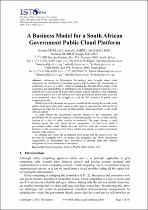JavaScript is disabled for your browser. Some features of this site may not work without it.
- ResearchSpace
- →
- Research Publications/Outputs
- →
- Conference Publications
- →
- View Item
| dc.contributor.author |
Mvelase, P

|
|
| dc.contributor.author |
Dlamini, Z

|
|
| dc.contributor.author |
Macleod, D

|
|
| dc.contributor.author |
Dlodlo, N

|
|
| dc.contributor.author |
Sithole, Happy M

|
|
| dc.date.accessioned | 2014-08-15T13:05:59Z | |
| dc.date.available | 2014-08-15T13:05:59Z | |
| dc.date.issued | 2014-05 | |
| dc.identifier.citation | Mvelase, P, Dlamini, Z, Macleod, D, Dlodlo, N and Sithole, H. 2014. A business model for a South African government public cloud platform. In: IST Africa 2014 Conference, Mauritius, 6-9 May 2014 | en_US |
| dc.identifier.isbn | 978-1-905824-43-4 | |
| dc.identifier.uri | http://hdl.handle.net/10204/7602 | |
| dc.description | IST Africa 2014 Conference, Mauritius, 6-9 May 2014 | en_US |
| dc.description.abstract | Advances in Information Technology have brought about cloud computing, an evolutionary computing practice that facilitates the provisioning of computing services as a utility. Cloud computing has brought about change in the economics and sustainability of Information and Communication Technology (ICT) enabled service provision. In South Africa, major aspects of public cloud computing or cloud in general have not yet been developed and realised and in some cases not even researched, hence the struggle to reach the full promises of public cloud computing locally. Whilst a lot of development and progress worldwide has already been made in the public cloud space, there still remains a wide range of concerns that still need to be addressed in order for it to reach its full potential, more specifically in the South African context. A study identifying fundamental services needed by the community and possibilities for and potential impacts of delivering public services in line with the concept of a cloud of public services is conducted. This paper designs a cloud business model that suits South Africa’s perspective. The idea is to model a government public cloud which does not interfere with the secured business functions of the government but find a suitable mechanism to extend government services to the citizens. In adopting this vision, the government must ensure that the cloud service still provides an acceptable level of security risk mitigation and allows government organizations to demonstrate their procedures of meeting legal and statutory obligations as far as information is concerned. | en_US |
| dc.language.iso | en | en_US |
| dc.publisher | IST Africa | en_US |
| dc.relation.ispartofseries | Workflow;12400 | |
| dc.subject | Cloud computing | en_US |
| dc.subject | Business models | en_US |
| dc.subject | Public cloud | en_US |
| dc.subject | Private cloud | en_US |
| dc.title | A business model for a South African government public cloud platform | en_US |
| dc.type | Conference Presentation | en_US |
| dc.identifier.apacitation | Mvelase, P., Dlamini, Z., Macleod, D., Dlodlo, N., & Sithole, H. M. (2014). A business model for a South African government public cloud platform. IST Africa. http://hdl.handle.net/10204/7602 | en_ZA |
| dc.identifier.chicagocitation | Mvelase, P, Z Dlamini, D Macleod, N Dlodlo, and Happy M Sithole. "A business model for a South African government public cloud platform." (2014): http://hdl.handle.net/10204/7602 | en_ZA |
| dc.identifier.vancouvercitation | Mvelase P, Dlamini Z, Macleod D, Dlodlo N, Sithole HM, A business model for a South African government public cloud platform; IST Africa; 2014. http://hdl.handle.net/10204/7602 . | en_ZA |
| dc.identifier.ris | TY - Conference Presentation AU - Mvelase, P AU - Dlamini, Z AU - Macleod, D AU - Dlodlo, N AU - Sithole, Happy M AB - Advances in Information Technology have brought about cloud computing, an evolutionary computing practice that facilitates the provisioning of computing services as a utility. Cloud computing has brought about change in the economics and sustainability of Information and Communication Technology (ICT) enabled service provision. In South Africa, major aspects of public cloud computing or cloud in general have not yet been developed and realised and in some cases not even researched, hence the struggle to reach the full promises of public cloud computing locally. Whilst a lot of development and progress worldwide has already been made in the public cloud space, there still remains a wide range of concerns that still need to be addressed in order for it to reach its full potential, more specifically in the South African context. A study identifying fundamental services needed by the community and possibilities for and potential impacts of delivering public services in line with the concept of a cloud of public services is conducted. This paper designs a cloud business model that suits South Africa’s perspective. The idea is to model a government public cloud which does not interfere with the secured business functions of the government but find a suitable mechanism to extend government services to the citizens. In adopting this vision, the government must ensure that the cloud service still provides an acceptable level of security risk mitigation and allows government organizations to demonstrate their procedures of meeting legal and statutory obligations as far as information is concerned. DA - 2014-05 DB - ResearchSpace DP - CSIR KW - Cloud computing KW - Business models KW - Public cloud KW - Private cloud LK - https://researchspace.csir.co.za PY - 2014 SM - 978-1-905824-43-4 T1 - A business model for a South African government public cloud platform TI - A business model for a South African government public cloud platform UR - http://hdl.handle.net/10204/7602 ER - | en_ZA |






